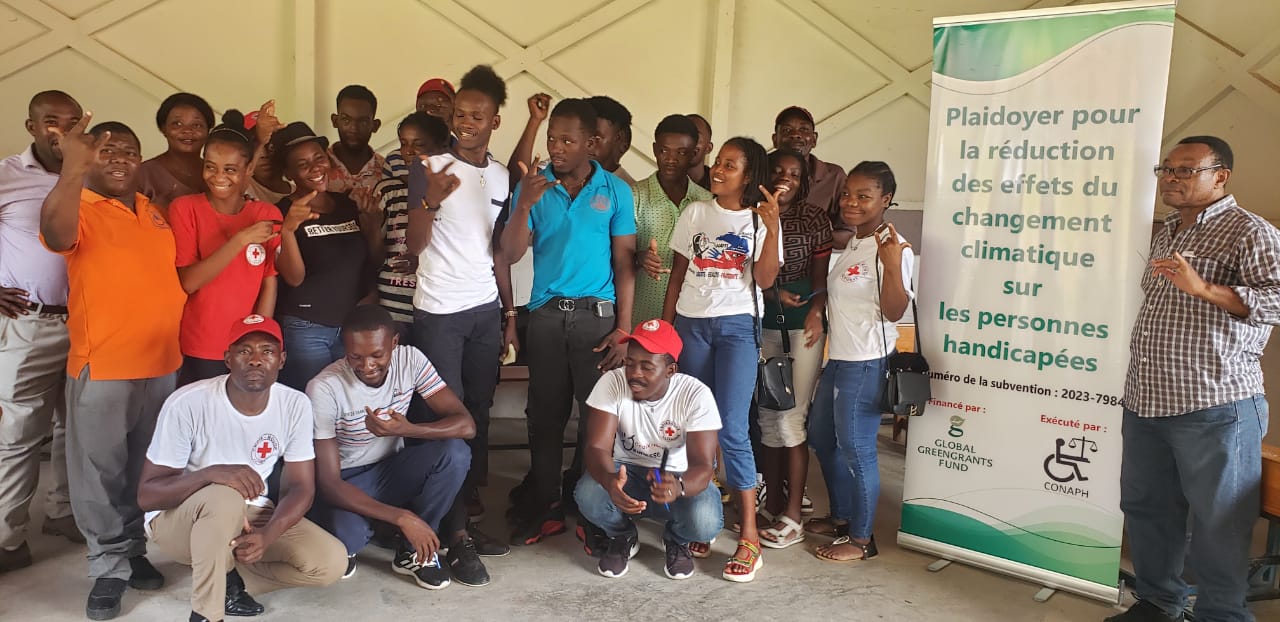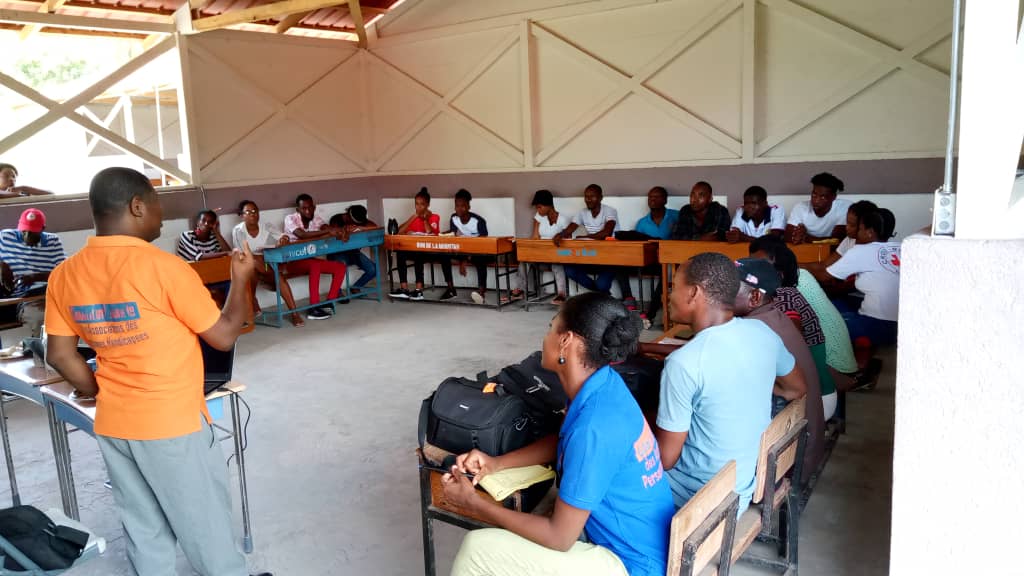The Disability Rights and Climate Justice (DRCJ) Advisory Board at Global Greengrants Fund is a global board founded in 2022 that encourages intersectional connections between disability rights and climate justice movements. In this blog series, we hear directly from those grantee partners, digging deeper into their contexts, their strategies for supporting disability rights and environmental justice, and their visions for a just world.
Article by Marianne Menut, Disability Rights and Climate Justice Board Learning Coordinator

Haiti is prone to natural disasters, especially cyclones and floods. While local authorities have designed plans to address climate disasters, these plans often fail to acknowledge the specific needs of people with disabilities. Greengrants recently spoke to Emilio Neas, a Haitian lawyer and disability rights advocate who works with grantee partner Coalition National des Personnes Handicapées (CONAPH) (National Coalition for Disabled People), to better understand the importance of including people with disabilities’ perspectives in natural disaster emergency response plans. He told us more about the context in Haiti, including infrastructure and political turbulence that have exacerbated the country’s natural disaster response, and about his work with CONAPH to ensure frontline workers are aware of the specific needs of persons with disabilities during natural disasters.
The risks faced by people with disabilities
In Haiti, the cyclone season typically lasts from June to November and the country recently experienced significant floods. During our interview, Emilio Neas pointed out that, while such events affect the entire Haitian population negatively, a systemic lack of accessibility creates particularly difficult conditions for people with disabilities. For instance, some may struggle to evacuate from dangerous situations, others may require medical assistance that is harder to access during an emergency, and others could be misinformed because of a lack of accessible guidelines and information. Neas shared that civil protection organizations also often overlook accessibility needs when designing emergency response plans.
Haiti also grapples with a general lack of infrastructure, particularly regarding access to electricity, which tends to be unstable and inequitable. Recent strikes at the national electricity company have further exacerbated power shortages for many Haitian households. The absence of electricity gives rise to communication, transportation, and safety challenges for all residents, but individuals with disabilities face even greater difficulties. For example, access to medical care is severely compromised as many medical devices rely on electricity. Emilio Neas emphasized that access to electricity is far from equitable; while wealthier individuals may access solar equipment or alternative power sources, less affluent families must endure the consequences of power shortages. This increases the complexity of systemic challenges that persons with disabilities face during and in the aftermath of climate disasters.
Fostering anti-ableist emergency response practices
The mission of CONAPH is to advocate for the potential of people with disabilities to catalyze social change. Neas stressed that the vision of a sustainable future cannot be achieved without including people with disabilities and their perspectives. In line with this goal of creating a more just, equal and sustainable future and with the financial support of Global Greengrants Fund, the CONAPH led a training session for Red Cross volunteers in Saint Louis on July 27th, 2023. During the training, a panel discussed Article 11 of the Convention on the Rights of Persons with Disabilities and the UN’s Sustainable Development Goals. CONAPH trainers also discussed disability-inclusive emergency practices. Overall, the workshop aimed to raise awareness around the intersection of anti-ableism and climate justice and to stress the importance of accessibility when designing emergency response plans. Through this training session, the CONAPH is calling local authorities, Red Cross volunteers, and community members to get involved in reducing the effects of climate change on persons with disabilities.

Why it matters.
Care for persons with disabilities should not be rooted in pity but in recognizing their inherent value and rights as human beings. In the below open letter addressed to disabled people, Emilio Neas urges people with disabilities to get involved in the struggle against climate change and make their voices heard. He stresses that climate activists and persons with disabilities should work to improve disabled peoples’ living conditions in their respective countries.
Message for disabled people from all around the world
By M. Emilio Neas, Av.
Lawyer and activist for the rights of persons with disabilities, and Coordinator of the Coalition Nationale des Associations des Personnes Handicapées (CONAPH)
Disabled people are all subject to inequalities, social injustice, repeated acts of discrimination, and marginalization based on ableist traditions, structures, and beliefs. Other structural inequalities such as race, skin, age, or social class can exacerbate the discrimination they face. Overcoming those inequalities requires a long-term struggle.
An inclusive world, one without inequalities and discrimination, is our vision. Thus, different actors need to take action: disabled persons, on the one hand, and supporters of the disability rights and climate justice movements, on the other hand, should all advocate for governmental authorities to adopt policies that improve disabled peoples’ living conditions in their respective countries. That’s why, through this letter, I am writing to all disabled people around the world and urging them to get involved in the disability rights movement, so that we can build a more just world together.
I know a lot of us are reluctant, lack self-confidence, and say that we don’t have the capacity, knowledge, or financial means. However, I really want to tell you that there are millions of ways to contribute and support each other as people with disabilities. Let your voices be heard through your support for organizations of persons with disabilities that advocate for the recognition of our rights and values. Let’s value our work. This is what will make us successful. Our generation might not see the changes associated with our work, but let’s work to create a better world for future generations.
***
Everyone must understand that the climate crisis, social inequalities, and ableism are intrinsically linked issues and must be tackled simultaneously. By supporting initiatives such as the CONAPH’s, Global Greengrants Fund affirms its commitment to a world that values inclusivity, justice, and care for all and for the planet. The Disability Rights and Climate Justice Advisory Board is also thrilled to support such creative and groundbreaking projects and hopes that this story will inspire others.
